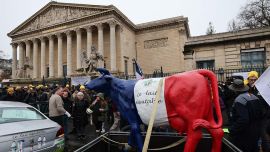Events in Argentina are moving too fast for the taste of New England academic Dr Hale, who writes:
“Almost 50 years ago now there was a movie satirising package tourism called If it’s Tuesday, this must be Belgium (the title was actually much better than the film) and that is kind of how I operate – there are five countries in the world (or economic sectors) which really fascinate me so I dedicate one day of the week to each of them. Not that I am especially interested in Belgium or even Brussels Eurocracy on Tuesdays or at any other time, but the following day is firmly reserved for Argentina in my book. This habit of mine has been extremely frustrating this month because my painstaking midweek analysis is constantly being overtaken by the news in the rest of the week. It started with announcement of an IMF agreement only hours after our email exchange. Then, after that agreement was widely hailed for restoring the Central Bank independence undermined last December, our next interchange was followed by news of the Central Bank governor being bounced. And last weekend a Cabinet mini-purge was announced around the time of the humiliating 1-1 World Cup draw between Lionel Messi’s star-laden squad and tiny Iceland (I don’t know which of these two things was meant to disguise the other). So where do we start? And where does it end?”
My reply:
“Belgium is not actually playing on any Tuesday in the first round of the World Cup at least, but I see your point. Mixed messages on the Central Bank certainly – I don’t know how naming the cousin of President Mauricio Macri’s best friend to its helm is going to convince the outside world as to the autonomy of monetary policy. Monetary policy has certainly been erratic over the last six months but to blame it all on Federico Sturzenegger and assume that his exit restores credibility is both simplistic and unfair. Not that Sturzenegger can entirely escape guilt for some recent tactical errors, whatever view is taken of his monetary strategy and vision. Anyway if Arnold Schwarzenegger is often identified with The Terminator, Sturzenegger has been terminated.
“The contradictions abound. That IMF agreement included defusing the Lebac time-bomb over the next year, a logic fully shared by the government, but the interest rates for these have now been jacked up to 47 percent in a bid to halt the dollar more than inflation, although it will probably not stop either – at the time of the agreement the credit line totalling US$56.5 billion fed optimism that a new Siegfried Line of a 25-peso dollar and 40-percent interest rates could be defended but both crumbled within days. Even that 47-percent yield only secured a 60-70 percent renewal of the Lebacs. That agreement also accelerates fiscal deficit reduction but Juan José Aranguren (architect of most of the progress thus far via the subsidy savings from his highly unpopular utility bill hikes) has been replaced as Energy and Mines minister by Javier Iguacel, reputedly far more of a softliner (still very early days to see how he resolves the collision course between the need to cut subsidies and the highly adverse impact of the steep energy and transport hikes on inflation data and opinion polls alike). Yet another contradiction is pledging a genuine currency float with the IMF after the last two months of frantic intervention, only to say that half the first tranche of US$15 billion will be used for the latter purpose. My own feeling is that pumping so much money (over US$12 billion in the last two months) into what has been traditionally such a tiny if overrated exchange market only feeds the beast.
“Yet despite such gloom and doom, it must be admitted that this week has gone pretty smoothly up to Flag Day, at least on exchange and money markets although with our luck this month I don’t know what black swans might loom for its close. Flag Day itself certainly did the nation proud with Argentina’s re-admission to emerging market status for the first time since 2009 – as I’ve said before, you cannot subject G20 heavyweights to the indignity of being chaired by a frontier market and nor do frontier markets easily gain admission to the Organisation for Economic Co-operation and Development (OECD). Emerging market status opens the door for the new Central Bank Governor Luis Caputo’s Blackrock and Templeton buddies in major global investment funds to buy into Argentine shares and bonds, thanks to this brand-new rating of Morgan Stanley Capital International (MSCI), also improving private-sector credit. About time that international investment gave Macri a break.
“Flag Day was a financial red-letter day indeed because it also saw the IMF board of directors rubberstamping the US$50-billion stand-by agreement reached at staff level (the news you were awaiting in our previous exchange). With the first tranche of the stand-by in the immediate term and with emerging markets offering access to capital on a broader scale by definition in the longer term, the calm up to Flag Day might well continue for a while with more dollar inflow, thus enabling us to enjoy (if that is the right verb) the rest of the World Cup in peace. But we should never underestimate the current potential for volatility both here and in the world at large.
“There are thus new hands in charge of monetary and financial policy but the real economy was given a new helm last weekend too – Production Minister Francisco Cabrera was replaced by economist Dante Sica. Far too early to give you any meaningful comment as to what this means in terms of making industry more competitive and improving the trade balance – I’d just like to say here that after making their names by commenting on the economic policies of others in the media for years, it will be interesting to see what economists like Sica and Treasury Minister Nicolás Dujovne do in the face of all the political and business lobbies now that they are holding the baby. This is all a bit superficial, I’m afraid, but the truth is that I’m taking a bit of a sabbatical to follow the World Cup.
“If it’s Tuesday, it must be Belgium – apparently next Tuesday Princess Astrid will be in town at the head of a 94-strong Belgian business delegation. Same day that Messi & Co. will be winding up the first round of the World Cup against Nigeria in Russia’s former capital.”



















Comments